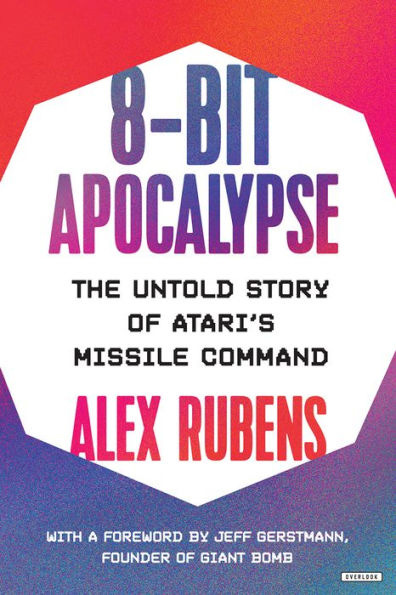
Writing Non-Fiction: Building Your Author Platform Through Publication (And a Bonus Cover Reveal!)

Get it because platform? Photo by Dan Gold on Unsplash
Platform is one of those tricky things that I find a lot of new writers wrestle with. Because the definition of "platform" is surprisingly varied. I’m going to write a few pieces that address it over the next few weeks, that I hope you’ll find helpful. First up, let's dig into building platform in publication. A little over two years ago, when I was still a Baby Agent™, what could only be described as a dream query floated through my inbox. It was a book about the history of the video game Missile Command, and the spiraling downfall of the game’s creator. See, the creator of the game, Dave Theurer, made the game as a way to protest nuclear war… and he became obsessed. And as the game rose in popularity and acclaim, Theurer suffered under the weight of his obsession. Now, there were a lot of reasons why this was the perfect pitch for someone like me. For one, I’m a massive geek who loves video games and I'm smitten with the history behind them. But what made me pounce extra hard on this book, on this query letter, was the author’s platform. From Alex’s query:
I’m a leading video game journalist, having written for more than 30 different outlets across web, print, and television, who specializes in capturing the human element of games.
Let that sink in for a minute. Thirty. Different. Outlets. A quick Google search for Alex Rubens showcases a writer with a massive platform. He’s quite literally written for just about every major video game outlet across print and the Internet. IGN. Kotaku. Giant Bomb. G4. PC Gamer. Complex. Polygon. And just so many more. And with the cover of Alex’s book dropping, I thought this might be a great time to talk about platform for non-fiction writers. Because I feel like there’s a bit of confusion when it comes to defining what “platform” is. Does it have to do with who you know? Your social media presence? Books you’ve already published? Articles? Essays? The places you’ve given talks or your regular speaking engagements? The short answer to all of that is yes. But first, let’s talk about platform as publication.
-#-
First things first. I can’t tell you how many writing workshops I attend where writers think “platform” means having a big Twitter presence. Tens of thousands of followers. A blue checkmark. A bunch of influential followers. Platform is more than just your social media following. And when I say that doesn’t matter, there’s generally a sigh of relief so intense, that I get knocked off my feet by the gust of wind. Look, social media helps. It looks good, having lots of followers. But your platform is more than that. Unless your book is about a Twitter persona, it should be more than that. I look at Alex’s Twitter following, a little over 4,000 people, and I’ll tell you what. We didn’t sell the book based on that. Sorry Alex. His platform existed off of Twitter, and that’s where some of the best platforms live. His platform exists in publication.
Building Platform in Publication

A well published platform. Photo by Sarah Ehlers on Unsplash
If you’re writing non-fiction, it becomes so much more than just having a social media presence. Your platform is built in publication. No, I’m not talking about books. After-all, you’re trying to GET published, right? If you have books out, great. That does help, of course. But I’m talking about essays and articles. Regularly publishing pieces related to what you’re writing, whether you’re writing about health, video games, pop culture, comics, history, science, or yourself, is an example of building platform. This does two major things for you as a writer of non-fiction, and this is why it's so important: One, it establishes that there is an audience and a demand for your work. Having pieces published in well known (and even smaller) places shows buy-in for you as a writer and as an expert. And this can build you a following, sometimes there in that particular outlet (maybe you have a column), or on your social media feeds, where your fans will likely follow you to read more of what you’re doing. This applies not just to writing non-fiction about history or pop-culture but writing about yourself. If you’re writing memoir, you should certainly be out there publishing personal essays wherever you can. Otherwise, I wonder who your audience is. And two, it establishes you as the expert. Look, your agent, editor, and eventual publisher isn’t just selling your book when it comes to non-fiction. They are selling you. You are the expert, and therefore, they need to show people that you’re the expert. And that only happens if you’ve done the work ahead of time. Publishing pieces in outlets that will showcase you as such. Alex, he’s published in scores of outlets, talking about video games. But most importantly, his piece on Missile Command was a massively viral hit on the gaming site Polygon. He’s covered this topic. People in the industry know him for it. He’s the established expert, and he did this through his writing. And those are the two major reasons that your platform is so important in publication. It shows your audience and it showcases you as the expert.
-#-
But enough from me, let's talk to the author who did this actual work, and see what you can learn from him on how to build all this up. Because how do you put this kind of work in? I chatted with Alex a little bit about his experience building his platform, and how he manages to juggle all of that with a busy day job. And be sure to check out the just revealed cover for 8-Bit Apocalypse: The Untold Story of Atari's Missile Command, below.

You write for a ton of outlets related to gaming, how did you get your start? I started writing for free at the age of 14 for my personal Wordpress and whatever sites would put up with the editing required to publish my work. Through attending industry events, I eventually made contacts who offered me paid work and started writing for bigger outlets like G4 at age 17 where I wrote the online reviews for their television shows like X-Play. From there it was all a matter of coming up with endless pitches and sending them to as many outlets as I could, making more and more contacts along the way. Once you have a few major outlets under your belt, it becomes a lot easier for editors to trust that you can write what you’re pitching and I slowly built up from there. I did this for a few years before making the switch to focus on competitive gaming (aka esports) content where the journey started all over again. How do you manage your time, with your journalism life and your day job? For the most part, I keep them very separate. I utilize days off to bulk conduct interviews and focus on research and writing at night. For me, a day job is a good way to support the dream of writing what I want to write without the pressure of deadlines or sales numbers. How difficult was it to expand this single long-form piece into a whole book? Both super easy and extremely difficult. It was easy in that I was super passionate about the message and knew there was enough to expand to a full book. It was extremely difficult to actually separate the two and remind myself that it could vary differently from the original piece. Eventually, I added so much that there’s very little overlap. What advice would you give to writers who want to work on non-fiction? Start by finding something you’re passionate about. If you don’t have that, it’s going to be much harder. This was an obsession for me. The story was too cool not to share so it made it easier to power through the difficult research phase. And those looking to establish themselves, and pitch places? Any tips? Number one tip: create unique pitches for the outlet you’re pitching. It has to fit their vibe. Saying “I’ll write anything” or sending your pitch out to 15 different outlets will never work. It has to be the right fit. Second: Pitch to the places you love to read. It may seem intimidating when you’re first starting and you’re likely to face some rejection, but you have to shoot your shot and it’s worth it in the end.
-#-
And there we have it. In my next roundup about non-fiction and platform, we’ll dig into memoir a bit more. Because there is just so much to talk about, and we only have so much room here. Good luck out there, writers!








